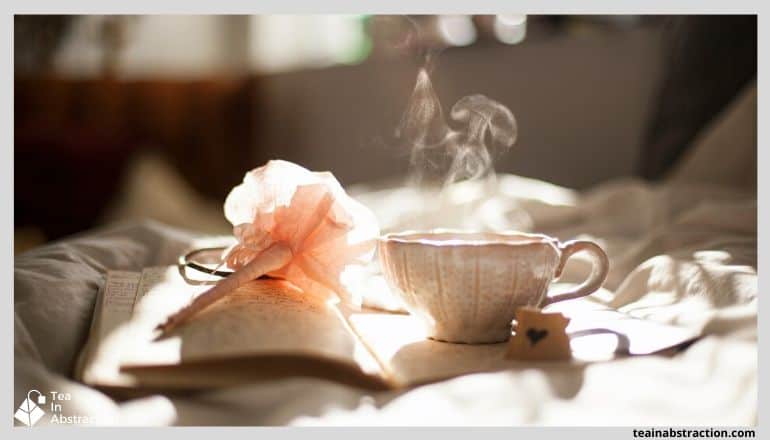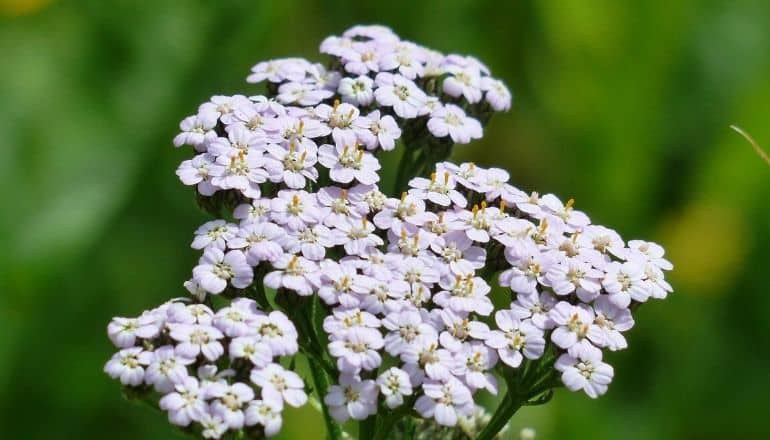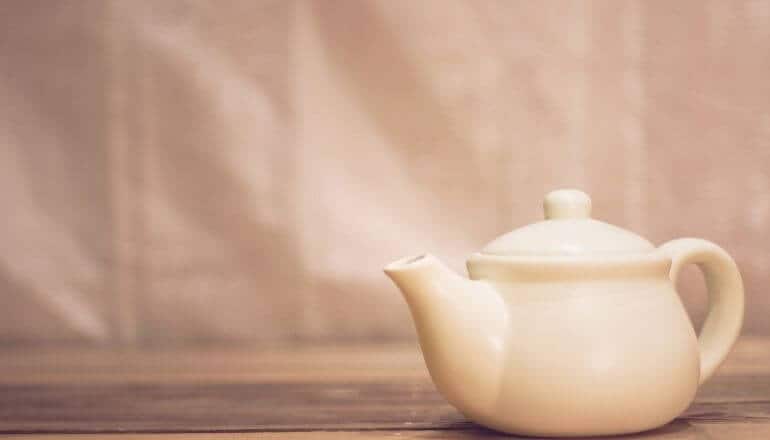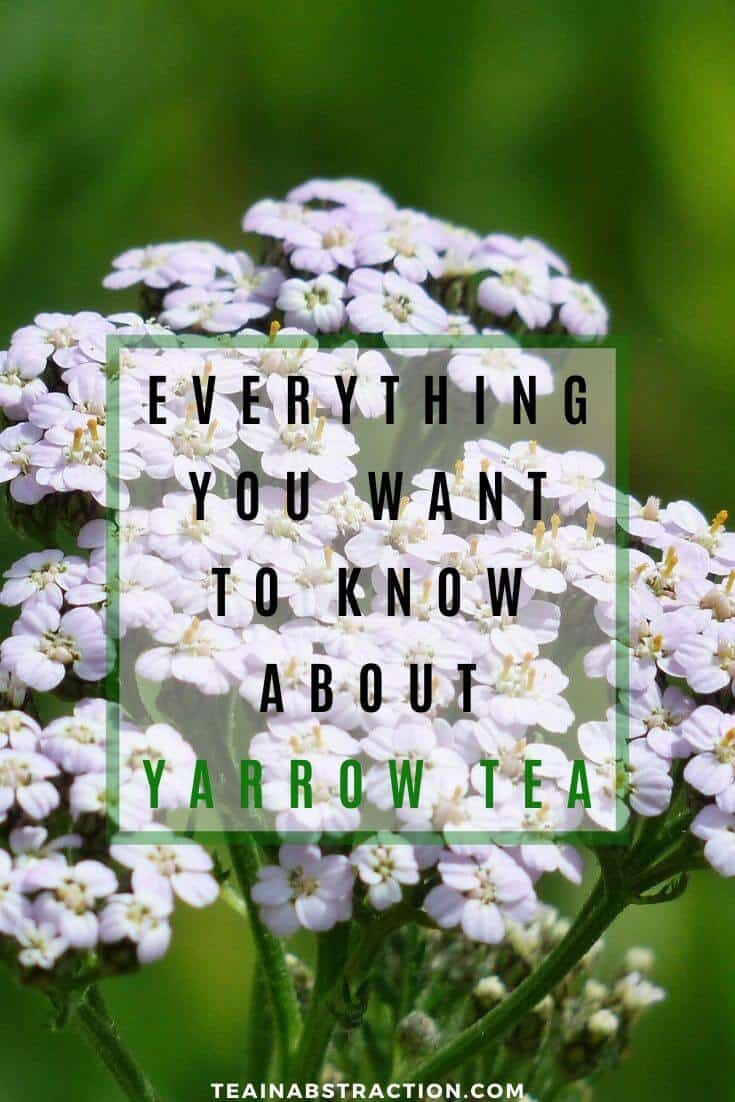*This Article May Contain Affiliate Links* See our Affiliate Disclosure for more Info
You have come here seeking information on this little-known wonder tea. Search no more my friend because you are in the right place. Yarrow Tea is an under-the-radar herbal infusion. It may not be as well known as some of the more popular herbal flower teas. But it comes packed with all the benefits and advantages that you have come to expect from herbal infusions.
Looking for a great example of a yarrow tea to try? I recommend Starwest Botanicals Organic Yarrow Flowers. If you are new to Yarrow tea or if you are seeking a little bit of extra information about this interesting herbal infusion then you have come to the right place.
Looking For Your Next Favorite Tea? Check Out The Great Teas, Blends, and Herbal Infusions at the Art Of Tea. They have teas for every taste and occasion.

The scientific name for yarrow is Achillea millefolium(source). It is found across most of the temperate climates around the northern parts of the planet.
It grows in Asia, Europe, and North America. It also grows in Australia, although it was an introduced species there. It is related to chrysanthemums and chamomile flowers. Recent studies have shown that yarrow tea does have quite a few real benefits for those who drink it, although much more research is needed(source).
Let’s have a look…
How To Make Yarrow Tea: The Perfect Cup
The perfect cup of yarrow tea is going to be very different from person to person. There is no right or wrong way to make a cup of tea. If you like your tea very strong then that is a perfect cup for you. Find your perfect cup with the help of these guidelines and remember they are just suggestions. Think of them as a starting point of your journey to make a perfect cup of yarrow tea.
How Long Should You Steep For?
Herbal flower teas tend to steep for much longer than your typical tea. While a nice green tea might only need to steep the tea for a minute, yarrow tea needs considerably longer to draw out the flavors from the yarrow flowers.
For a good cup of yarrow tea, I recommend a 5 to 10-minute steep as a starting point and then adjust to taste. I usually let it steep for about 7 or so minutes when steeping loose-leaf yarrow and always steep your tea with a cover to trap in the flavors and the heat while steeping.
For a yarrow tea bag, I find that the steep time is typically a little less than loose leaf. But it usually comes down to personal preference for the steep time of any tea really.
The Ideal Temperature
Yarrow is not a delicate as your standard green and white tea and can take a bit more heat than those true teas. Keep your water just under the boiling point when you start steeping your tea and you should be fine on temperature.
I like to use water that has been heated to around 205°F/96°C. You can use this handy Fahrenheit to Celcius conversion table to find your perfect temperature.
I typically like to heat my water to the desired temperature instead of boiling it and letting it cool, but either way is fine. I use the HadinEEon Variable Temperature Electric Kettle(*Amazon Affiliate link) to get the perfect temperature for my yarrow tea.
Just to reiterate, always keep your steeping tea covered to maintain a more consistent temperature.
How Much Yarrow For A Cup Of Tea?
The amount of yarrow flowers that you want to use for a cup of tea is really down to personal preference. I like using around 2 teaspoons of dried flowers for about an 8-10 ounce cup. One yarrow tea bag should be enough for a solid cup of tea. As always, experiment with different amounts until you find your sweet spot for making a cup of yarrow tea.
Yarrow Tea Steep Instructions Quick Recap
- Use Good Quality Spring Water Or Filtered Tap Water
- 1 Yarrow tea bag or 2 teaspoons of dried yarrow flowers
- Water Temperature Should be about 205°F/96°C. But it is not as critical as it is for some other types of tea
- Steep your yarrow tea for 5 to 10 minutes depending on personal taste
- Enjoy your cup of yarrow tea
What Does Yarrow Tea Taste Like?
When it comes to tea the most important aspect is how it tastes. everything else pales in comparison if you can’t get your tea to a place where you’re comfortable with the taste of it. So it’s important to know what to expect from your tea or herbal infusion. So let’s look at the flavor profile of yarrow tea. understanding the basic flavor elements of yarrow tea is going to help you make a great cup every time.
Yarrow Tea Is Very Bitter
The first thing that you going to notice about this tea is that it is very bitter. A lot of herbal teas, particularly flower herbal infusions, tend to have a bit of bitterness associated with them. And of course, regular teas can be bitter if they’re steeped in properly or if that’s just their overall flavor profile.
But this level of bitterness is something a little bit different than what many people might be used to. It is bitter to a fault in many cases. It doesn’t seem to matter how well you steep it because the bitterness is just ingrained in the flower itself.
The bitterness of yarrow tea is just something you’re going to have to accept or you’re going to have to cut the bitterness back by adding in a sweetener. Honey is a very popular additive. But remember when you add honey you are adding calories.
If that’s something that’s going to upset your diet you might want to think about blending it with another tea that can also help fight back against the bitterness of yarrow tea.
It Has An Earthy Flavor
Another hallmark flavor of flower herbal teas is a bit of an earthy undertone to the tea. You tend to find this earthy flavor in root herbal teas as well. For Yarrow Tea, the earthy bass really acts as a background flavor for the tea.
I don’t think that the earthy flavor really does anything to help with the bitterness of the tea. I think it’s just another flavor that’s in the tea at is just there. It doesn’t really bring anything to the tea in this case. I think that might be because the overwhelming bitterness of the tea really pushes every other flavor down and really dominates the entire flavor experience.
There Is Little Natural Sweetness
Here is the real problem with the yarrow flower infusions and the one flavor aspect that I think makes it a real tough herbal infusion for many people to drink. And that is its almost complete lack of any natural sweetness. Typically when you have these herbal flower teas you find that the bitterness of them is cut back a little bit by the weakness of the tea.
But there is no sweetness in your yarrow tea to fall back on and help cut through the bitterness. This becomes a real issue if you don’t like your teas very bitter. Even some of the most experienced tea drinkers are really put off by the level of bitterness found in yarrow tea. You can add a bit of sweetness to your tea to help counteract the bitterness but you never really going to get rid of it completely.
Yarrow Infusion Tastes Medicinal For Many People
Yarrow tea is often described as having a medicinal flavor. This is a tough flavor to describe because what might be medicinal for you may not be for me. Personally, I don’t find it too Medicinal. Although there is that kind of sense of a little bit of an herbal flavor that might be reminiscent of very unsweet cough medicine.
I guess that’s the best way that I can describe “medicinal” but you’re going to have to try for yourself and figure out exactly what the medicinal flavor means to you if you can even detect it.
The Aroma Of Yarrow Tea
Yarrow tends to have a pungent aroma to it. It has a bit of a sweet smell to it which really belies the bitter taste of the steeped tea. I find the smell to be pretty herbal but I have seen it described as smelling like a carrot as well. I only get a hint of carrot when I smell it, but I hate carrots so maybe it’s just a mental block.
Overall the taste and the smell are a bit different. The sweetness of the aroma does not make it into the tea and the bitterness and earthy flavor aren’t really that present in the aroma, although there is a hint of it.

Image by Hans Braxmeier from Pixabay
A Few Amazing Yarrow Tea Benefits
Yarrow has long been used to treat a variety of ailments throughout history. Science has shown some of these benefits to be of some actual use, but many lack the scientific backing to make a case for them one way or the other. These traditional herbal uses for Yarrow might not be backed by modern science. Here are some of the biggest benefits of yarrow and yarrow tea.
Yarrow Has Anti-Inflammatory Properties
When drunk, yarrow infusions can reduce inflammation in the mouth and digestive tract. This can help reduce pain associated with some digestive ailments, although not much scientific data has been produced on this specific subject. It has been used in traditional medicine as an anti-inflammatory for centuries in many parts of the world(source).
Benefits Digestion
The flavanoids in Yarrow can help increase stomach acid and digestive enzymes(source)which in turn can improve digestion. It may also act as a muscle relaxant that can help ease stomach aches and pains(source).
Helps Reduce Fever
Yarrow has been widely recognized as a fever-reducing herb. This is largely due to its anti-inflammatory properties(source). This, along with its wound-treating capabilities is probably its most famous benefit. When used as an infusion yarrow tea can help induce sweating and in turn, reduce your fever(source).
Yarrow Can Be Used To Treat Wounds
This benefit is more along the lines of the yarrow flower in general rather than just the yarrow tea. Yarrow can be made into a salve to treat minor wounds and abrasions and help stem bleeding on minor cuts. Yarrow has been used for centuries as a type of battlefield salve due to its alkaloid content(source).
These aid in the coagulation of blood and help close wounds quickly. The plant itself is named after Achilles who used it to stop the bleeding of his soldier’s wounds according to the Illiad(source).
Yarrow Can Be Used As An Insect Repellent
Yarrow might be useful as an insect repellent when mixed with other oils like lavender and catnip. You can find an interesting recipe for yarrow bug repellent here.
Side Effects
Yarrow might cause skin irritation in people who are allergic or sensitive to it. It might also have diuretic properties which can increase the need to use the bathroom. Yarrow tea is considered safe when you drink it.
Yarrow tea might negatively affect pregnancy and breastfeeding, be sure to check with your doctor before consuming yarrow tea if you are pregnant or breastfeeding(source).
Allergies to the yarrow or to its closely related plant species should be discussed with your healthcare professional before drinking yarrow tea(source).
Crafting A Yarrow Tea Blend
Yarrow tea is not the most inviting herbal infusion around. As discussed in the flavor profile of yarrow tea it’s quite bitter and it can be very off-putting if you’re not expecting the level of bitterness that this flower herbal tea brings.
One option to cut through the bitterness is to add a sweetener to the tea but you are then putting calories into your drink and it’s not always the best solution for everyone.
So another option is to craft some yarrow tea blends that will help balance out the bitterness of the yarrow tea while introducing new and interesting flavors into your infusion. Here are a few of the best yarrow blends that I think help make yarrow tea taste better.
Yarrow And Ginger Tea
I love ginger so I tend to try it out as a blend for just about any herbal tea. Most of the time it works out quite well for just about everything. Yarrow ginger tea is no exception. The spicey pepper flavor of ginger really helps settle the bitterness of the yarrow tea. It does not remove the bitterness but it makes the infusion a lot more drinkable.
A Quick Yarrow and Ginger Tea Recipe
- 2 teaspoons of loose-leaf yarrow or 1 yarrow tea bag
- 2 slices of fresh ginger, about 1/8th inch thick
- Boil the ginger with the water and let it steep for a good 5 minutes on the boil.
- Allow your ginger infusion to cool briefly. Then steep your yarrow in the ginger-infused water for a wonderful yarrow tea blend.
Anise Seed And Yarrow Tea
Another great little yarrow blend that I like from time to time is anise seed yarrow tea. The light licorice flavor of the anise seed and its natural sweetness really help smooth out the bitterness of the yarrow. Once again the bitterness is still there but it is much more drinkable with the anise seed tea blended in.
Anise And Yarrow Tea Recipe
- 1 teaspoon of Anise Seed
- A teaspoon of Yarrow Leaf
- Then just steep normally as if you were making a cup of yarrow tea.
- If you are using bags I recommend using a bag of each and doubling the amount of water. Basically making 2 cups of this yarrow blend.
- You can find loose-leaf yarrow tea at Starwest Botanicals.
Yarrow, Peppermint, And Elderflower Tea
I really like this little yarrow tea blend in the winter. The spicy peppery flavor of the peppermint really helps drown out some of the yarrow teas bitterness, while still retaining some of its earthy charms. You can check out my flavor profile of peppermint tea for more information on it.
The elderflower brings in a nice floral note to the blend and rounds out the flavors with its own added earthy flavor and a slight sweetness that further helps with the bitterness of the yarrow tea.
A Quick Yarrow, Peppermint, And Elderflower Tea Recipe
- A teaspoon of Yarrow
- A teaspoon of Elderflower
- 1/2 teaspoon of peppermint
- Steep normally as you would for a cup of yarrow tea. About 5-10 minutes in around 200°F water.
- Adjust the amount of tea to your liking, this recipe will produce a very strong tea, dial it back if you need to.
Another option is to buy it premade, with some added flavors. You can find these ingredients in the Teatox Life Cold Season Support Tea(*affiliate link) on Amazon. This tea has quite a few other flavors added to it but it blends pretty well together making for a nice herbal blend.
Yarrow and Lavender Tea
Yarrow and lavender make a very nice herbal infusion when you pair them together. Lavender is part of the mint family so you get a tiny bit of minty spiciness when you add the lavender with the yarrow tea. The spiciness helps cut through the bitterness of the yarrow and then when you add on the floral notes of the lavender you get a really nice flavor that makes the yarrow tea that much more palatable.
Yarrow And Lavender Tea Recipe
- A teaspoon of Lavender And Yarrow each
- Steep as normal for an herbal tea about 5-10 minutes
- Enjoy
Experiment with your own yarrow tea blends to find the flavor combinations that you really enjoy. This is half the fun of drinking herbal infusions.

Related Questions
Here are some of the most frequently asked questions that I have come across with regard to Yarrow tea. It is by no means a comprehensive list. I will add to it when I find some newer questions that start getting asked a lot. For now, here are the most asked questions about yarrow tea, in my opinion.
Where Can You Buy Yarrow Tea?
Yarrow tea has become popular enough that you can find it in many tea and herb shops around the world. Online it can be found at the usual retailers for the most part. If you are looking for loose-leaf yarrow to craft your own cup of yarrow tea or blend it with other flavors then I recommend Starwest Botanicals Organic Loose-Leaf Yarrow Flowers.
Does It Have Caffeine?
Yarrow tea is naturally caffeine-free. Yarrow tea is an herbal flower tea and does not come from the tea tree that regular tea comes from and therefore has no caffeine in it. This makes yarrow tea a good tea to have before bedtime since it will not affect your sleep rhythm as a true tea would.
How Do You Dry Yarrow Flowers?
You can dry yarrow flowers by leaving them out on a piece of paper towel for a good while. The exact time will vary depending on your environmental factors. But it should not take too long. You can make yarrow tea out of fresh flowers the same way you would with dried flowers. Drying the flowers helps to preserve them so that you can store them for later.
Does It Have Calories
Yarrow tea does not have any calories to speak of. There are trace amounts of calories in a cup of yarrow tea but not enough to really make an impact on your diet. As with anything you should always consume yarrow tea in moderation, but you can do so with the confidence that yarrow tea is not adding any noticeable amount of calories to your overall diet.
Is It Sugar-Free?
Yarrow tea is naturally sugar-free. Many people add honey or a sweetener to their yarrow tea because it can be somewhat bitter. But in its natural state, it is a great alternative to any drink that has sugar in it. Yarrow tea makes a great replacement for soda or fruit juice especially if you are looking to lower your sugar intake.
Does Yarrow Tea Have Carbs?
Yarrow tea has negligible carbs. There may be trace amounts of carbohydrates in yarrow tea but most labels will not include them in their nutritional information. This makes yarrow tea a great option for anyone on a low-carb diet or anyone looking to cut back on sugary drinks in general.
Is This Tea Good For Fasting?
Like many other herbal flower teas, Yarrow tea is great for anyone who is fasting. Yarrow tea has negligible calories and can be drunk during your fasting window. Water should still be the main liquid you drink during a fast but yarrow tea can help suppress any hunger pains that might come along.
Is Yarrow Tea Keto Friendly?
Yarrow tea is a great option for anyone on a keto diet. The consensus for this herbal flower tea is that it will not break your ketosis and is an acceptable alternative to water when you are on a keto diet. Yarrow tea also makes a great alternative to coffee if you want to drink butter tea, also known as bulletproof tea.
Is Yarrow Safe For Dogs?
While yarrow is considered poisonous to your pup it would take an incredible amount to make your dog sick by ingesting it(source). It can be used externally to treat wounds for both you and your best friend, you can learn more about the healing properties of yarrow here.
What Part Of Yarrow Is Edible?
Yarrow leaves and flowers are the most common parts of the plant that people tend to eat. The leaves are quite bitter and are a great addition to salads in their raw form or they can be cooked in any number of ways that you would typically cook similar plants.
The flowers are also edible but the most common use for them is to make a cup of Yarrow tea. Like the plant itself, the tea tends to be quite bitter forcing many people to add a sweetener to their cup of yarrow tea.
The Big Finish
In case you haven’t noticed by now yarrow tea is not my favorite flower herbal infusion in the entire world. Typically I don’t mind a bit of bitterness in my tea if it’s part of the overall flavor profile and not part of a poor steeping process. But in the case of yarrow tea, I think it’s just a little bit too much because there’s really nothing else in the flavor profile that’s really appealing to me.
There’s a bit of everything this to it but that comes with just about every herbal infusion. Other than that there’s really not a whole lot to get excited about with yarrow tea, in my opinion. That being said a lot of people love this tea and the benefits of it are absolutely fantastic. So finding a way to make it a little bit more palatable is a great way to get the benefits without having to deal with the overwhelming bitterness.
Check out some of the Blends that I put in this article and craft some yourself and maybe you can find a place for yarrow tea in your tea-drinking repertoire. I don’t think yarrow tea will ever be as popular as some of the other flower teas like chamomile or lavender. I do think that adding it to your tea rotation is a good idea every once and a while is a good idea if for nothing else to get the benefits of this herbal tea.
That’s all I got for you today thanks for stopping by and have a wonderful day.
